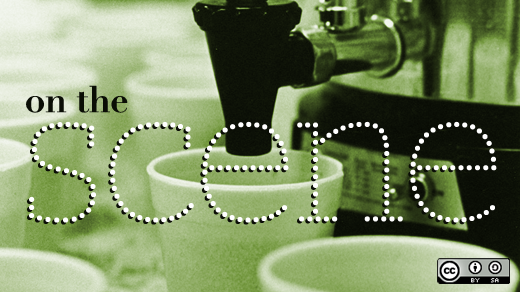You know what's fun? Watching an entire conference unfold on Twitter. That's what I'm doing at Big Ideas Fest 2010 (#bif2010). It's amazing how much you can rightly infer by paying close attention to a dozen people tweeting about the same speaker -- and it's also a great way to learn which elements of a speech had the most impact.
Sugata Mitra is the founder of Hole in the Wall experiment, which inspired the writing of Slumdog Millionaire. On the same day he keynoted at Big Ideas Fest, a story about his Self-Organized Learning Environments hit Slashdot.
Below is a list of all of the points from last night's keynote that were tweeted independently by at least two people. It would be fascinating to compare this list to Dr. Mitra's speaker notes.
1. Most of the kids in the world have inadequate educational resources.
@herdpress Keith Morris #bif2010 Dr. Mitra: Of the 1B children on Earth. 50M have ample resources, 200M have adequate resources, 750M have inadequate resources.
@richardlcox richardlcox Of the 1billion children in the world, 750 million have inadequate resources. 50 million ample. Rest adequate. #bif2010
2. Everywhere in the world, there are places where good schools can't be built.
@hfordsa hfordsa Dr Sugata Mitre of Hole in the Wall Project makes the great point: there are places everywhere where good schools cannot be built #bif2010
@jackiegerstein JackieGerstein Ed.D. There are places in every country where, good schools cannot be built and good teachers cannot or do not want to go #bif2010 Sugata Mitra
3. Inequality in education is really about "remoteness", and there are many ways to define that term.
@ricetopher Christopher S. Rice The problem of inequality isn't an urban-rural prob it's a remoteness prob: geographical, socio-economic, religious. - Sugata Mitra #bif2010
@sewsueme Suzanne Walsh There are lots of different kinds of *remoteness*: geographical, socio-economic, religious. - Sugata Mitra #bif2010
4. Kids in Indian slums can and will teach themselves both English and how to use the internet without any help at all.
@richardlcox richardlcox Dr Mitra put a computer in a slum in India in a DIY ATM setup. In 8 hours children taught each other to browse the web. #bif2010
@herdpress Keith Morris #bif2010 Amazing. Kids taught themselves English in order to learn how to use the computer.
@dcinc66 David Bill #bif2010 Students in India used two positives. They learned English in order to operate a computer that used English.
5. Dessert was awesome, and Keith Morris might be a dangerous mooch.
@jackiegerstein JackieGerstein Ed.D. Dessert at #bif2010 https://plixi.com/p/61282707
@herdpress Keith Morris #bif2010 I'm eating @MEnista's dessert. :-D
@herdpress Keith Morris #bif2010 Uh oh. It's possible that wasn't meant for @MEnista. :-O
6. Children are capable of developing their own pedagogies.
@dcinc66 David Bill #bif2010 leave children with a problem but no pedagogy. Leave it up to the students to develop and solve.
@jackiegerstein JackieGerstein Ed.D. Who are the learners (kids) to invent pedagogy? But they had done it #bif2010 Sugata Mitra
@sewsueme Suzanne Walsh Sugata asks tongue firmly in cheek: "Who are children to invent pedagogy? We are supposed to do that" #bif2010
@ricetopher Christopher S. Rice Shorter Dr. Mitra: "The kids are alright." Give motivated learners a problem, tools to solve it & they'll invent their own pedagogy #bif2010
@richardlcox richardlcox Indian children created their own pedagogy 4 learning English w/ online oxford English dictionary & speech 2 text 2 learn & test. #bif2010
7. Teachers who can be replaced by machines should be; if children are engaged, then education just happens.
@dcinc66 David Bill #bif2010 a teacher that can be replaced by a machine should be. If children have interest, education happens.
@jackiegerstein JackieGerstein Ed.D. If children have interest, education happens #bif2010 Sugata Mitra
@eknight Erin Knight If children have interests (aka are engaged), education happens #bif2010
8. The bars that students set for themselves are frequently higher than the bars that teachers set for them.
@sewsueme Suzanne Walsh "the bars that children set for themselves can be higher than those we have set for them"-- Sugata Mitra #bif2010 Important lesson!
@dcinc66 David Bill #bif2010 the bars students set for themselves are usually higher than what is set for them by teachers.
9. The Granny Cloud. (The Granny Cloud? Yes, the Granny Cloud!)
@inVisionConsult Natalie J Thoreson #bif2010 The Granny Cloud!
@sewsueme Suzanne Walsh I am so in love with the Granny Cloud #bif2010
@hfordsa hfordsa Wow. The Granny Cloud are beamed by skype into Indian schools to support and encourage. #bif2010
@dcinc66 David Bill #bif2010 the granny cloud. Recruiting grandmothers to teach via skype: https://bit.ly/eRf93C
10. Reading comprehension and information search and analysis skills are the most essential skills for primary education.
@dcinc66 David Bill #bif2010 "information search and analysis and reading comprehension are most essential skills for primary education."
@herdpress Keith Morris #bif2010 Mitra: Information search and analysis & reading comprehension are the most essential skills for Primary Education today.
11. The educator's most important job is to ask the right questions. Students will figure out the rest.
@sewsueme Suzanne Walsh "You should ask children really really hard questions" --Sugata Mitra #bif2010
@jackiegerstein JackieGerstein Ed.D. You can drive children with questions - you don't have to give them the answers. They can find the answers - Sugata Mitra #bif2010
@dcinc66 David Bill #bif2010 We must drive students with the right questions. They don't need facts.
12. What's the secret behind Sugata Mitra's pedagogical method?
@herdpress Keith Morris Dr. Mitra: "I have no idea, and I'm going away." #bif2010
@inVisionConsult Natalie J Thoreson #bif2010 Dr. Mitra's teaching method: "I have no idea. And now I am going to go."







Comments are closed.